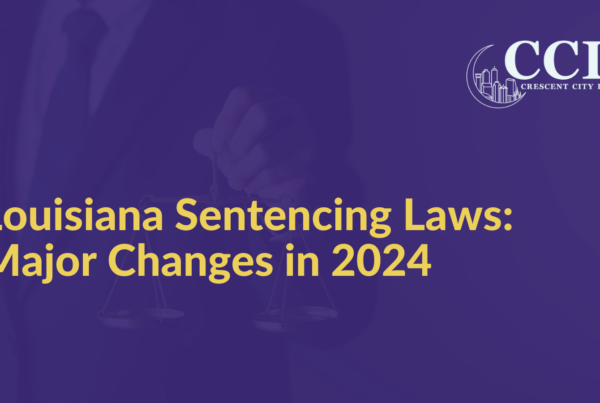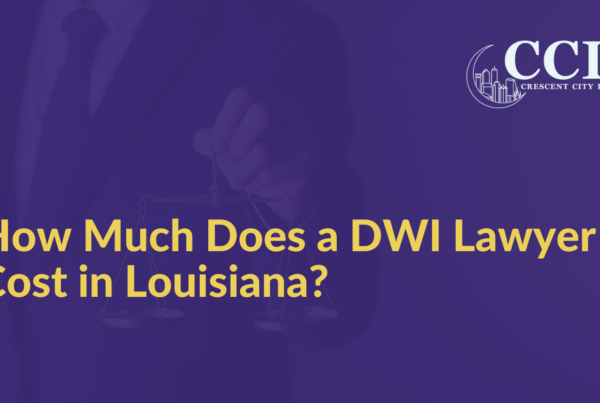In preparation for the recent changes at the New Orleans Traffic Court, I wrote a letter to my current and future clients to explain how the new Traffic Citation Policy in New Orleans Traffic Court could effect their case. This letter is designed to explain many of the possible consequences of the policy change. If you received a traffic ticket in New Orleans, La., and are considering hiring a lawyer to represent you, I urge you to read this letter.
July 2, 2015
Dear Clients:
This letter is in reference to the City of New Orleans’ decision to prosecute all tickets issued in the city to the fullest extent of the law. My name is John Radziewicz and I am the attorney who you hired to represent you.
You are receiving this letter because the New Orleans City Attorney’s Office has implemented a new procedure wherein they require all people who are issued tickets in New Orleans to either plead guilty as charged to all tickets or to go to trial. In the past, I have been able to provide most clients the service of either having their ticket dismissed entirely or greatly reduced by amending the citation to a single, non-moving violation which stays off their driving record to avoid increased insurance costs. However, the new policy does not allow for dismissals or reductions for any traffic ticket or DWI charge.
The process began in late May and was supposed to have a 30 day test. As of July 1, 2015, the policy remains in full force. Therefore, I am compelled to send you this letter to explain the possible consequences the policy, from worst to best:
1) You may elect a judge trial and the judge may find you guilty of all of the citations on the traffic ticket. If the judge finds you guilty of the violations, you will be ordered to pay fines and court costs, and there will be negative remarks on your driving record. Negative remarks on your driving record may result in increased insurance costs.
2) You may elect a judge trial and the judge may find you guilty of some, but not all, citations on the traffic ticket and will be ordered to pay somewhat less fines and court costs. There may still be negative effects on your driving record, which may result with increased insurance costs.
3) You may be able to plead guilty pursuant to Louisiana Code of Criminal Procedure Article 892.1 (the full text of Article 892.1 is below), which allows you to attend traffic school at a Louisiana approved traffic school program. Upon completion of the Driver improvement program, the law permits the judge to aside the conviction and dismiss the prosecution. The law also permits the court to defer sentencing (imposition of fines or fees) to allow you time to complete the driver improvement program. Pursuant to Article 892.1, no insurance company shall increase premiums for any driver whose case was dismissed under article 892.1 or because the driver completed a driver improvement program. There may still be fines and court costs associated with this option.
4) You may be able to plead guilty to some, but not all, citations on the traffic ticket and will be ordered to pay somewhat less fines and court costs than pleading guilty as charged to all tickets.
5) You may elect a trial by the judge and the judge may find you not guilty. The case will be closed, you will not have to pay any fines or fees to the court and there should not be any negative points on your drivers licenses so there should not be any increases in your car insurance bill.
6) I may still be able to negotiate a plea to a lesser/reduced moving or non-moving violation.
In order to go to trial in any of the options above, your presence will be necessary. I understand that many of my clients are unable to be present in person in New Orleans for their traffic court hearings and trials. If you are unwilling or unable to appear in court, there are a few options.
- You may elect to plead guilty as charged.
- You may elect to continue your cases as far into the future as possible in hopes the City’s police will change.
- You may complete the an “Affidavit Allowing my Attorney to Act in my Absence/Plea in Absentia” form in the presence of a notary public. This form will allow me, as your attorney, to proceed to trial in your case without you. By signing this form, you are granting me a power of attorney which permits me to act as your agent in court and to waive your presence at trial, if necessary. Once this form is signed, I will do what I believe is in your best interest in the courtroom. Basically, this is a way for me to appear on your behalf so we can proceed to trial even if you are not present. I should emphasize that any of the 6 options are still possible even when your allow me to Act in Your Absence.
Finally, I should point out that going to trial is always a gamble and the house wins more often than the players. When you go to trial you accept the greatest risk for the greatest possible chance of a dismissal of all charges. Before choosing to go to trial, I believe we have to exhaust all other resolutions for your case.
When the policy first changed, I wrote a blog about this topic, New Orleans Traffic Court: Plead Guilty or Go to Trial. The New Orleans Advocate wrote an article about the policy, which can be found using this link: New Traffic Court refrain on plea deals: ‘Take your lick, or go to trial’
I understand there will be many questions after reading this letter. I appreciate your business and look forward to answering your questions so you can make an informed decision. Should you find you have any questions, please do not hesitate to contact me at my office (504) 264-9492 or by e-mail at crescentcitylaw@gmail.com. Thank you.
Regards,
John J. Radziewicz
La. C.Cr.P. Art. 892.1.: Driver improvement programs
A. Whenever, in a misdemeanor case, a person is convicted of violating any law of this state that regulates traffic or any parish or municipal ordinance that regulates traffic, or when a child is decreed by a court to be a traffic violator, regardless of any sentence imposed, the court imposing sentence may order the person or child to attend and participate in a driver education, training, or improvement program approved by the court or the violator may choose a program approved by the Department of Public Safety and Corrections, office of motor vehicles as provided and pursuant to the conditions in R.S. 32:402.2.
B. Notwithstanding the provision of any other law to the contrary, upon conviction for the first time only of a misdemeanor offense under Title 32 of the Louisiana Revised Statutes of 1950 that regulates traffic or of any similar parish or municipal ordinance that regulates traffic, the court may suspend the sentence for such offense and order the defendant to attend, at his cost, a driver education, training, or improvement program as provided for in Paragraph A of this Article.
C. Upon completion by the defendant of the driver program, the court may set the conviction aside and dismiss the prosecution.
D. All driver improvement courses under this Article shall include instruction on railroad and highway grade crossing safety.
E. The court in its discretion may defer sentencing and allow the defendant ninety days to present a certificate of course completion as evidence that, subsequent to the alleged act, the person has successfully completed a driver education, training, or improvement course as provided in Paragraph A of this Article when all of the following conditions are met:
(1) The person, except as provided in Paragraph G of this Article, enters a plea in person or in writing of nolo contendere or guilty and presents to the court an oral request or a written request, in person or by mail postmarked on or before the appearance date on the citation, to take a driving course.
(2) The court enters judgment on the defendant’s plea of nolo contendere or guilty at the time the plea is made, but defers the imposition of the whole or any part of the sentence for ninety days.
(3) The defendant has a valid driver’s license or permit.
(4) The defendant’s driving record as maintained by the Department of Public Safety and Corrections does not indicate successful completion of a driver’s education, training, or improvement course under this Article within the two years immediately preceding the date of the alleged offense.
(5) The defendant files an affidavit with the court stating that he is not in the process of taking a course under this Article and he has not completed a course under this Article that is not yet reflected on his driving record.
(6) The offense charged is for a misdemeanor offense under Title 32 of the Louisiana Revised Statutes of 1950, except when the offense involves speeding twenty-five miles per hour or more over the posted speed limit at the place where the alleged offense occurred.
F. A written request to take a driving course under Subparagraph E(1) of this Article is timely if it is postmarked on or before the appearance date on the citation.
G. A court shall not require a minor who is sixteen years of age or younger to enter a plea of nolo contendere or guilty under Subparagraph E(1) of this Article.
H.(1) When a person complies with Paragraph E of this Article and a certificate of course completion is accepted by the court, the court shall set the conviction aside and dismiss the charge, but the court may only dismiss one charge for completion of each course.
(2) When a charge is dismissed under this Paragraph, the charge shall not be part of the person’s driving record or used for any purpose; however, the court shall report that the person has successfully completed the driving course and the date of completion to the Department of Public Safety and Corrections for inclusion in his driving record. The report shall indicate that the course was taken under the provisions of this Article to determine eligibility to take a subsequent course under such provisions.
(3) No insurance company shall increase the premium or cancel an insured’s policy merely because of an offense dismissed under this Article or because the insured completed a driving course under this Article.
I. The court may require the person requesting a driving course to pay a fee set by the court at an amount that does not exceed ten dollars to cover the cost of administering this Article. Fees collected by a municipal court shall be deposited in the municipal treasury. Fees collected by other courts shall be deposited in the criminal court fund of the parish in which the court is located. If the person requesting a driving course does not take the course, he is not entitled to a refund of the court fee. In addition to the cost of the driving course, the person shall pay any fines and costs for the driving offense.
J. The authority vested in courts by this Article is in addition to any authority granted by other laws with respect to persons convicted of traffic violations and children decreed to be traffic violators.






